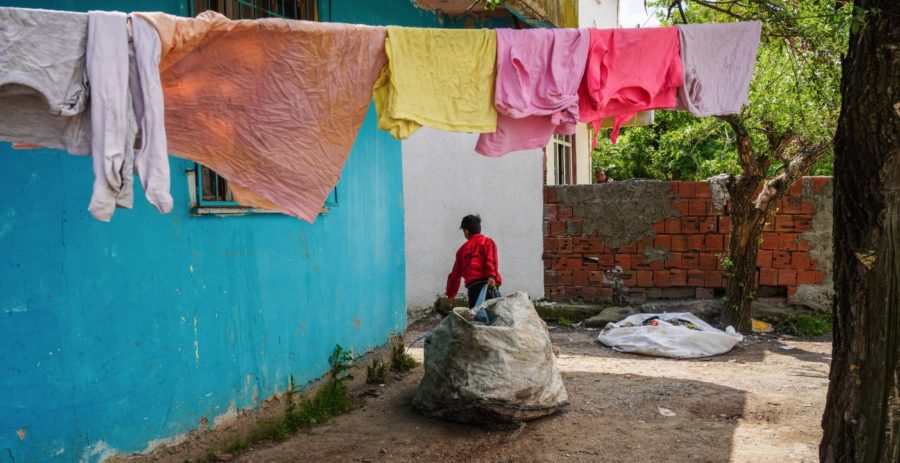
Open Space Association – Deep Poverty Network (Açık Alan Derneği – Derin Yoksulluk Ağı) received a grant from our Institutional Fund in 2021 to strengthen its advocacy capacity. The Association will carry out activities to promote the acceptance of poverty as a human rights violation in the political arena, civil society, and media, and make the multidimensional nature of poverty visible to the public.
Read below our interview:
You have recently published the book titled Absent Stories. What made you choose this title? Can you tell us about the content of the book?
We were inspired by Çiğdem Mater’s “Woman State of the Story” podcast on Açık Radyo and wanted to refer to both the invisible state of urban poverty and “absence”, which is the common theme of the stories. We aimed to make the voices of the people who experience poverty be heard through the book. The first part of the book consists of the stories of 14 people supported by the Deep Poverty Network. Along with the stories, we added relevant articles from international human rights law and related news and research data that make the human rights violations in each story visible. The second part consists of stories witnessed by the Deep Poverty Network and the journalist and activist Hacer Foggo, who has been working on poverty for 20 years.
In addition to the pandemic, the economic crisis also negatively affected the families you work with. How has deep poverty changed in Turkey since your network started its work?
Due to the economic crisis and inflation, it is now increasingly difficult for people living in poverty to reach their basic needs. In addition to the daily price increases in food and sanitary products, with the rising prices of electricity and gas, it is difficult for everyone to achieve healthy, safe, and decent living conditions, which are fundamental human rights. In these economic conditions, people living in deep poverty face the risk of hunger and homelessness, and the number of working poor is increasing day by day.
We argue that poverty is a violation of human rights and can only be prevented with sustainable and holistic policies.
The number of people seeking support from the Deep Poverty Network is increasing, and we are having difficulty responding to new applications due to our limited resources. Recently, we saw that the need for heating, nutrition and school supplies are critical in homes with children going to school. While trying to support these needs, we continue to make the conditions of deep poverty visible. We argue that poverty is a violation of human rights and can only be prevented with sustainable and holistic policies.
You have established collaborations with 11 local governments to create emergency response strategies for combating poverty. Can you tell us about the scope of these collaborations and the role of local governments?
We organised the meeting series titled We Talk Poverty with Local Governments with the support of the National Democratic Institute Program, of which we are a participant in the 2020-2021 period, aiming to strengthen the cooperation between local governments and civil society actors. At the meetings, the participants discussed how local governments handle poverty and their evaluation criteria. The outputs of the meetings were reported. Also, a communication channel was created where local governments and the Deep Poverty Network could exchange ideas and information on strategies for combating deep poverty.
We believe that poverty reduction is a common responsibility that local governments, public institutions, the private sector, and civil society organisations should undertake jointly. Only when this responsibility is shared, it is possible to produce a realistic and rights-based solution. Local governments are important actors that can take action locally in the fight against poverty and develop strategies by identifying the specific needs of regions experiencing poverty.
We believe that poverty reduction is a common responsibility that local governments, public institutions, the private sector, and civil society organisations should undertake jointly.
Which organisational development areas have you focused on with the grant provided by the Institutional Fund?
We focused on the goal of creating a sustainable financial model. For this purpose, in the field of fundraising, we prepared a budget strategy, organised donation campaigns, strengthened donor relations, established corporate collaborations, followed grant calls, prepared grant proposals, and increased interaction with other stakeholders. At the same time, we worked on renewing the association’s charter, specifying the staff’s job descriptions, establishing a work plan and enhancing the internal communication to strengthen the organisational structure.
How has the support you received under the Institutional Fund contributed to your association and your work? Do you have a message for our donors who support the fund?
Thanks to this grant, we had the opportunity to establish a sustainable financial system. This way, our field activities became more organised and efficient, and we supported more families living in poverty. In addition, our credibility has increased and we became more visible in the media. We have succeeded in reaching a wider audience, the number of our donors has increased, and we developed new project ideas. The donors who supported us contributed to the long-term sustainability of the Deep Poverty Network, an initiative of the Open Space Association, and laid the groundwork for it to continue its activities in the coming years.
About Open Space Association
Open Space Association carries out activities in the fields of socio-cultural empowerment and poverty. The Association conducts workshops and training programs with a rights-based perspective, especially for Roma children, youth, and women, and conducts field research to carry out advocacy activities on eliminating poverty. The Association established the Deep Poverty Network in March 2020, to combat extreme poverty during the pandemic to work on disadvantaged families’ access to basic needs.



